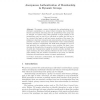Free Online Productivity Tools
i2Speak
i2Symbol
i2OCR
iTex2Img
iWeb2Print
iWeb2Shot
i2Type
iPdf2Split
iPdf2Merge
i2Bopomofo
i2Arabic
i2Style
i2Image
i2PDF
iLatex2Rtf
Sci2ools
102
click to vote
FC
1999
Springer
1999
Springer
Anonymous Authentication of Membership in Dynamic Groups
Abstract. We present a series of protocols for authenticating an individual’s membership in a group without revealing that individual’s identity and without restricting how the membership of the group may be changed. In systems using these protocols a single message to the authenticator may be used by an individual to replace her lost key or by a trusted third party to add and remove members of the group. Applications in electronic commerce and communication can thus use these protocols to provide anonymous authentication while accommodating frequent changes in membership. We build these protocols on top of a new primitive: the verifiably common secret encoding. We show a construction for this primitive, the security of which is based on the existence of public-key cryptosystems capable of securely encoding multiple messages containing the same plaintext. Because the size of our construct grows linearly with the number of members in the group, we describe techniques for partitioni...
Related Content
| Added | 04 Aug 2010 |
| Updated | 04 Aug 2010 |
| Type | Conference |
| Year | 1999 |
| Where | FC |
| Authors | Stuart E. Schechter, Todd Parnell, Alexander J. Hartemink |
Comments (0)

